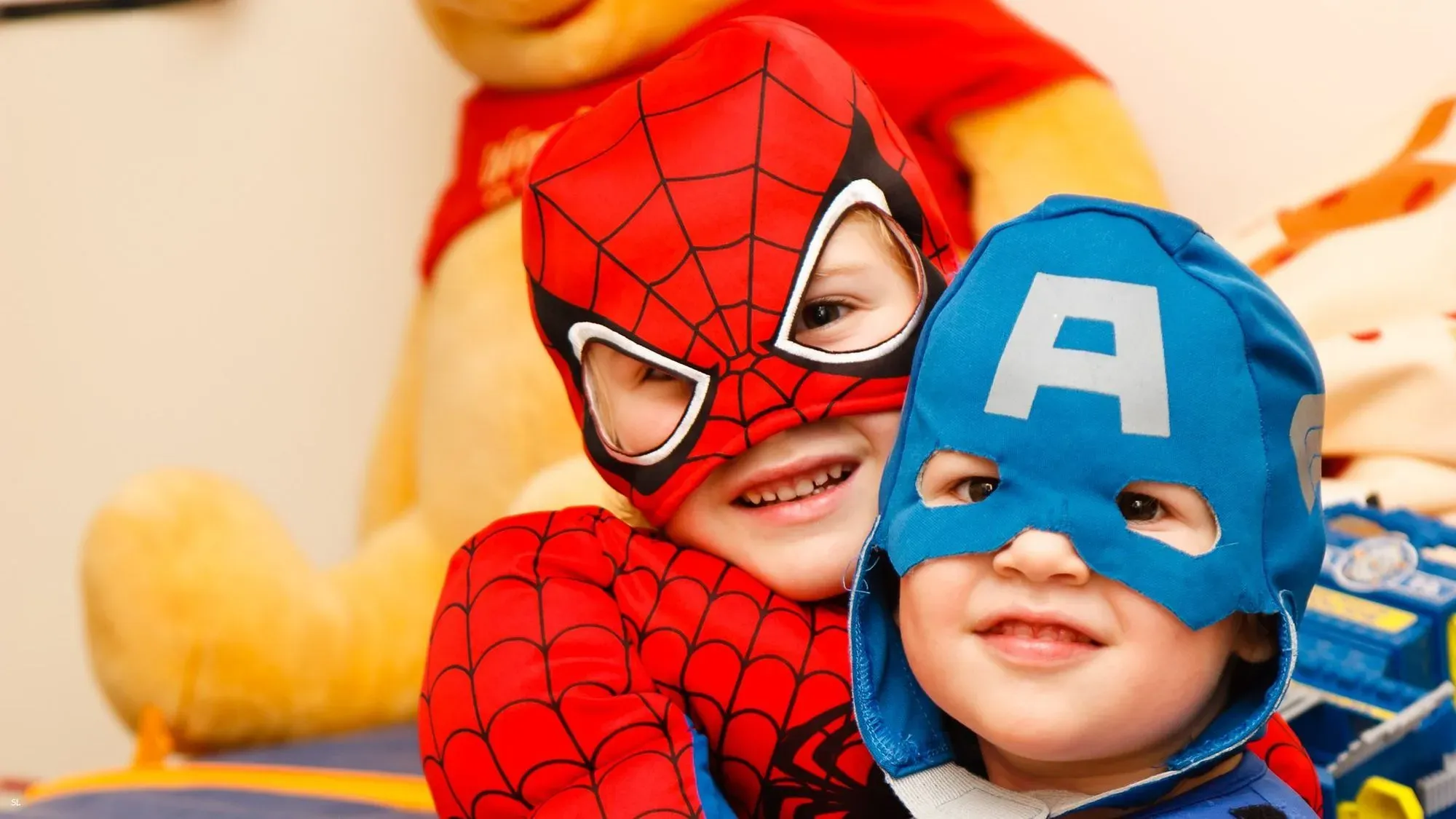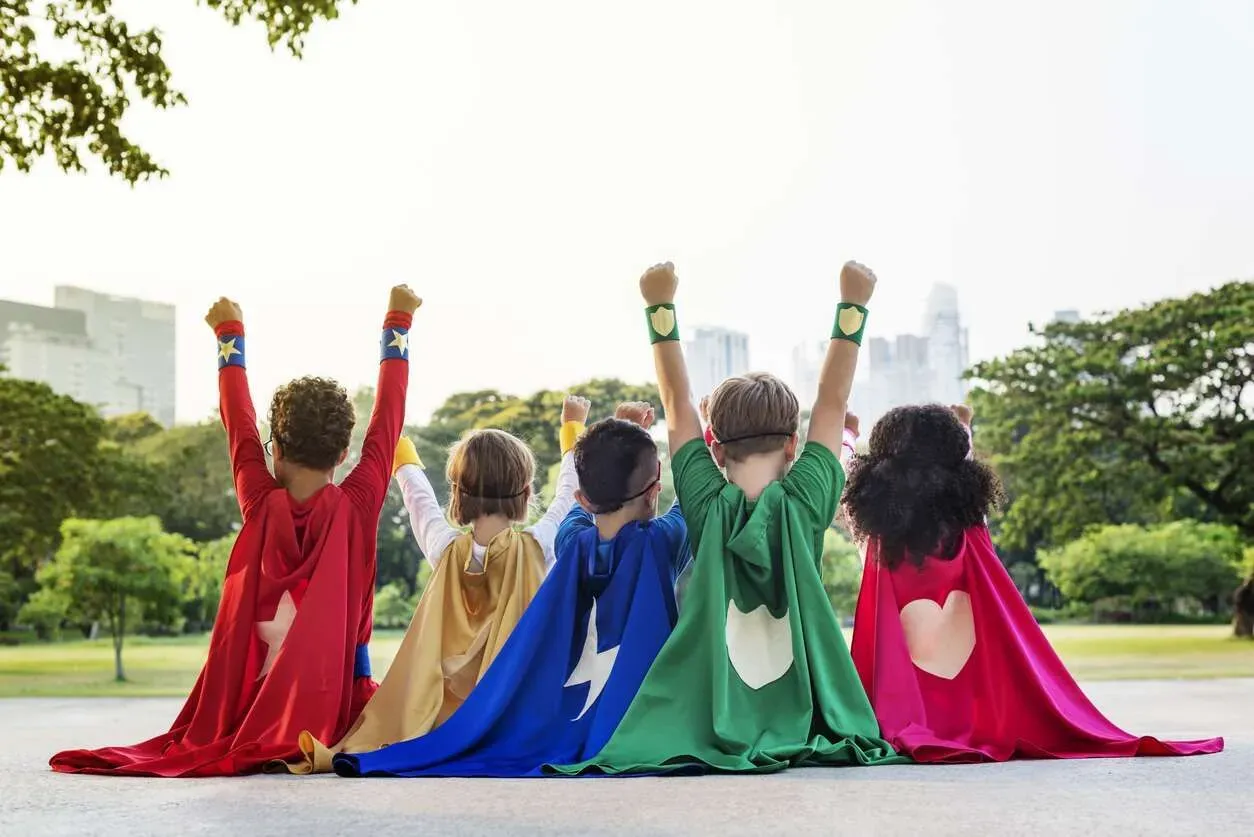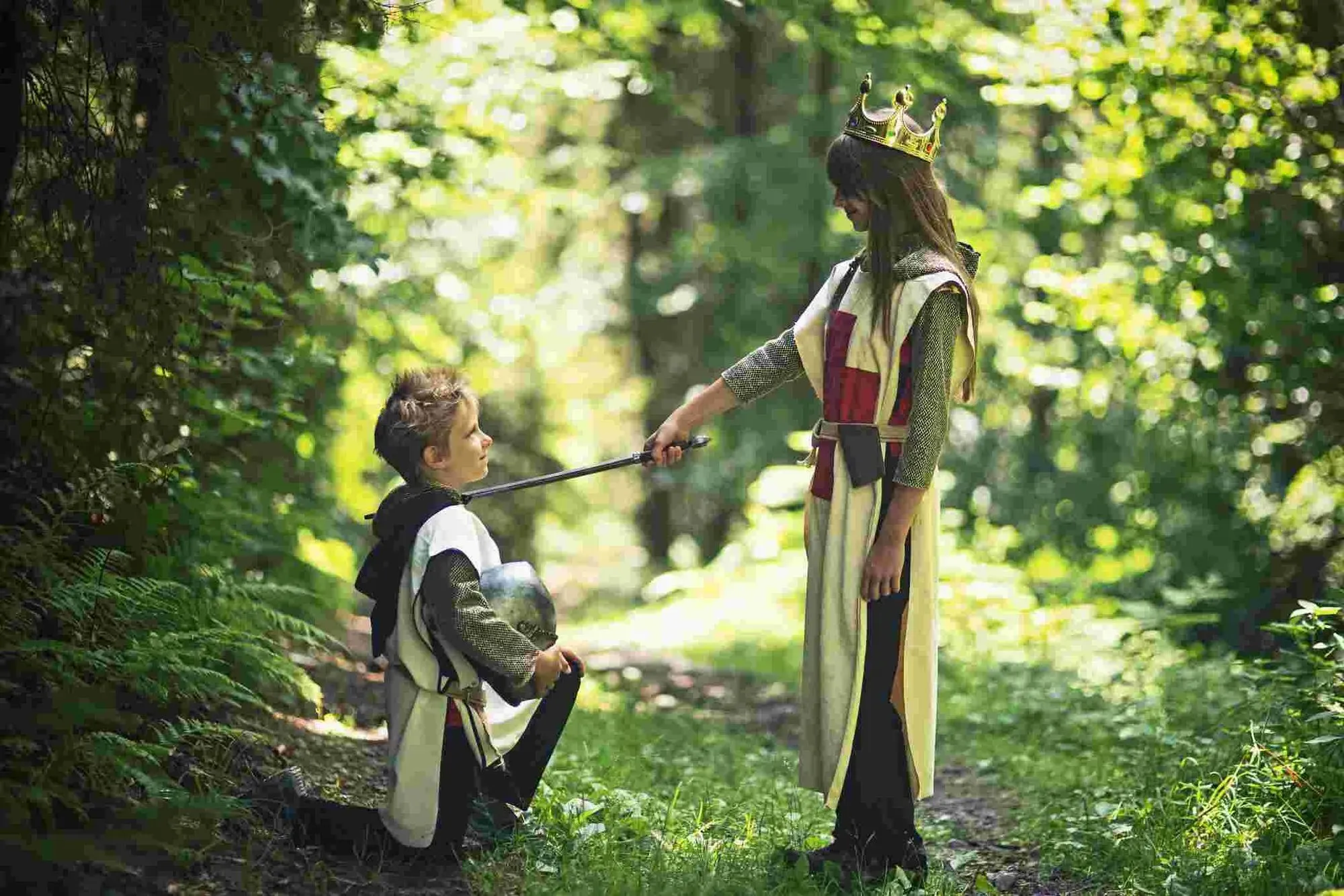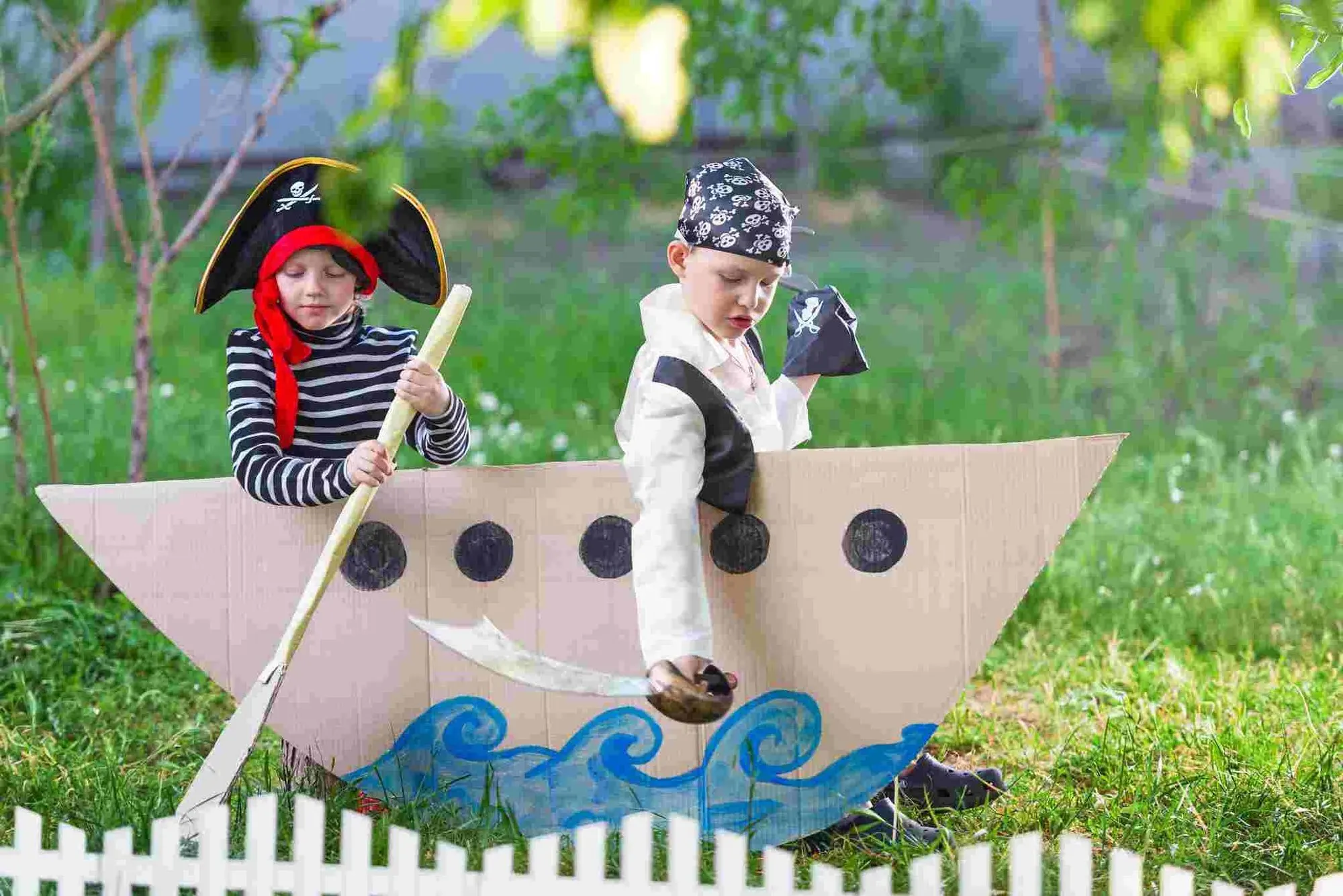What is an Easy Starter Role Playing Game
Role-playing games - or RPGs - are set in fantastic, imaginary worlds, and players are encouraged to build relationships and use their imaginations to create a story.
RPGs are an opportunity for all the members of the family to come together to share a fun adventure - and all from the comfort of your house - which makes RPGs a particularly good choice during lockdown. Role-playing games are a great way to empower children - bringing them out of their shells by allowing them to shape the stories that they tell, rather than simply observing them from the outside.
RPGs always have a 'gamemaster', who guides the story and who keeps everyone on track. If you're the adult, chances are you'll also be the gamemaster - so it's important that you fully understand the game before starting to play with the kids. The gamemaster sets the scene and oversees the rules - whilst the players decide how the scene will unfold, and what will happen next. We have gathered some tips that will help keep the game on track, as well as listing some role play games kids might like to try.
Focus On The Story
The best part of a role-playing game is the different characters and the story, so focus on that rather than explaining all the rules of the game. Only the gamemaster needs to know the mechanics of the game, so try to think of a way of describing the game and the story in just one or two sentences, keeping it fun and interesting for the other players.
Let the kids focus on the story, moving forward all the time - and the gamemaster can simply let the players know which dice to roll, which card to collect or what moves they can make when the time comes.

Have Fun Creating Characters
Most role-playing games need the players to make their characters before they start to play - so make this part as fun, imaginative and engaging as possible. Younger kids may need some help to imagine a new character - so help them out by listing their favourite books, films or cartoons, and use these as the basis for their character. If your kid loves dinosaurs, why not create an Indiana Jones-type character - or if your children like Harry Potter, why not base the game in a magic school and have the kids create their own magical characters.
RPGs often have a sheet where you list the traits and characteristics of the characters in the game - so to keep it fun, have the kids introduce themselves to the group, whilst the gamemaster completes their character sheet using the information in the introductions.

Total Freedom Or Multiple Choice
Older or more experienced RPG players often like to have total freedom in the game - choosing to do whatever they can imagine - but, this can be overwhelming for players who are new to the game or trying to learn the rules.
In this situation, it may be better for the gamemaster to give the players some options to choose from, as this will keep the game moving and kids won't feel overwhelmed. As kids learn more about role-playing, they tend to want more freedom to choose their own path, so feel free to use both multiple-choice options and total freedom throughout the game.
Controlling The Chaos
Role-play games let kids do whatever they want - and sometimes they can go crazy with their new powers! Role-playing is a great activity for kids to let off some steam - but if the group gets too loud or frantic, then simply explain that the story can't continue until everyone is listening.
Kids often want to push the boundaries, but the gamemaster should explain that even in the RPG the characters should not hurt one another. The gamemaster has lots of ways to stop one character from hurting another - making it is easy to avoid fighting, tears or tantrums.

Say Yes To Your Kids
A role-playing game is fun because kids get to use their imaginations, so let them! Say 'yes' to their crazy suggestions and their wild choices - and let them get excited about the many possibilities of role-playing. If a player suggests something impossible, then let them try - and if it fails, just congratulate them for trying as you describe what happens next...
Watch The Players
Role-play games can be adapted and changed to suit the group, so the gamemaster should spend some time watching what makes the players happy and excited, and then focus on that. The gamemaster's job is to make sure everyone is having a great time, so use your power to get everyone involved and having fun.
Also, some games can take hours and hours to complete, so take regular breaks - and if the players seem restless ask them if they would like to continue the game another day. For younger players, aim to keep the games short - choosing a simple goal that can be completed in one short session.

Dungeons & Dragons
Perhaps the best-known RPG is Dungeons & Dragons (D&D). Popular with adults and kids, D&D can quickly get complicated, but there are some easier versions that have been designed for beginners, including the D&D Starter Set and the Pathfinder Beginner Box. When playing, the gamemaster can make choices about the level of violence or the types of monsters that are appropriate for the players, adapting the game to suit younger kids.
Little Wizards
Little Wizards is less well-known than Dungeons & Dragons, but it is just as magical! Little Wizards is set in the charming land of Coinworld - which is flat with two sides, Head and Tails. Kids can complete adventures and challenges on both sides of Coinworld, and players win or lose by rolling a dice, which keeps the rules simple and easy to understand.
Perfect for kids who love magic, players are either Lil' Sorcerers, who are born with magic, or they are Lil' Mages, who have learned magic. These characters have different magic powers, and the game even comes with a few 'Tales' to help get you started.

No Thank You, Evil!
One of the most fun RPGs for children, 'No Thank You, Evil!' is the latest game from Monte Cook Games - whose other RPGs include Numenera and The Strange.
'No Thank You, Evil!' has been designed for younger kids to play - adapting the basic rules of RPGs to make it easier for children to get involved. Kids make characters by using the game's simple sentence system, where young players complete the following sentence "I'm a Noun" and older players complete "I'm an Adjective Noun who Verbs" - and the players can also choose a companion character to play with.
Set in 'Storia, the Land Next Door' - kids explore amazing places like castles, rocket ships and forests filled with dinosaurs, and there are lots of different types of adventures to take.
Mouse Guard
A more complex game that is perfect for older kids, Mouse Guard gives the players lots of freedom to control how the story evolves, and the game focuses on more detailed role-playing and character building. Each session of Mouse Guard has a set structure which helps to guide the players through the game. Sessions always start with a prologue, before the players receive their mission and get given goals to complete. Filled with an amazing cast of characters, Mouse Guard is perfect for older kids, teens and adults - and if your kids enjoy playing in this world, they can also read the graphic novels that inspired it.
At the end of each session or game, the players get together to discuss what happened in the game-deciding whether the characters met their goals or achieved their mission. The players receive rewards and points - which are carried forward to be used in the next session.

Happy Birthday, Robot!
Even very young children will enjoy playing 'Happy Birthday, Robot!' as it is much less complicated than traditional RPGs. A group storytelling game with a very clear structure to follow - every game begins with the sentence, 'Happy Birthday, Robot!', before the gamemaster rolls some dice to decide what happens next. At the end of each game, the players will have used their imaginations to create a new story about what happened to the Robot on his birthday.
'Happy Birthday, Robot!' is easy to teach so the game can get started quickly, and each session lasts around half an hour. Although the game is difficult to find in print, the publisher, Evil Hat, sells a pdf version of the game - and it is very easy to modify normal dice using stickers (or you can use the 'Fate' dice used in Evil Hat's other RPGs). To download the digital version of this fun family game, visit the Evil Hat website, which includes the complete rules for how to play 'Happy Birthday, Robot!'. To play, you will also need to gather several other items, as the game requires 10 - 15 dice, 20 coins, a notebook and a pen or pencil.
Source: https://kidadl.com/home/beginners-guide-to-role-playing-games-for-kids-and-teens
0 Response to "What is an Easy Starter Role Playing Game"
Post a Comment